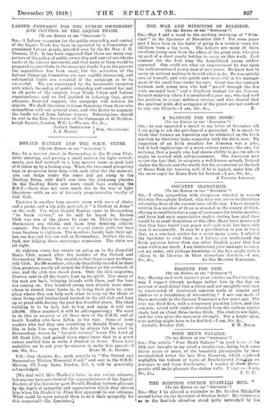DONALD HANKEY AND THE O.B.M. CLUBS. [To THE EDITOR or
TIED " SPECTATOR."[
Srn,—In a narrow street in Bermondsey is the Decima Club.
After entering, and passing a small canteen for light refresh- ments, you find yourself in a long narrow room—a good half of it taken up by a boxing ring. When the two small perspiring boys in possession have done with each other. for the moment, you can dodge under the ropes and get along to the Reading Room, only don't run into the ping-pong players. In the Reading Room are more small boys studying the B.O.P.—thore does not seem much else in the way of light literature—with an air of leisurely proprietorship worthy of Pall Mall.
Upstairs is another long narrow room with rows of chairs and a piano, and a big jolly portrait of " A Student in Arms " on the wall. For when Donald Hankey came to Bermondsey " to learn service," as Ire said he hoped to, Decima Club was one of the places he came to. This is the chapel. Downstairs are shields and team lists denoting athletic contests. For Decima is one of several junior clubs for boys from fourteen to eighteen. The members hardly look their age, but one does not live too well in Bermondsey. Neither the air, food, nor lodging there encourages expansion. The clubs are all right.
At eighteen every boy counts on going on to the Stansfeld
Men's Club, named after the founder of the Oxford and Bermondsey Mission. The trouble is that there is now no Stans- feld Club. Its 200 members, already dreadfully crowded in their then premises, nearly all joined the Colours at the outbreak of war, and the club was closed down. Only the club magazine, Pratres, sent to all the fronts, kept up its spirit. Now many of the men are back, bringing friends with them, and the boys are coming on. Five hundred young men already want some- where to stretch their limbs in, to bring their girls to; some place where they can help each other to keep up the ideals of clean living and brotherhood learned in the old club and kept up at great odds during the past fire dreadful years. The ideal building is to be had, but to buy and equip it will cost £10,000. (Once acquired it will be self-supporting.) We want to do this in memory of all those men of the O.B.M. and of South London who have fallen in the war. Some of your readers who feel they owe something to Donald Hankey may like to help him repay the debt he always felt he owed to Bermondsey, where he "learned service," wrote The Lord of An Good Life, and gained those experiences that to a great extent enabled him to write .4 Student in Arms. These facts embolden me to ask your leermiesion to make this appeal.-1
P.S.—Any cheques, &c., made payable to " The Oxford and Bermondsey Mission Memorial Fund," and sent to the O.B.M. Mission, 175 Long Lane, London, S.E. 1, will be gratefully acknowledged.
[We deal with Miss Hankey'e letter in our review columns, but express here our sense of the appropriateness of the Appeal. Readers of the Spectator gave Donald Hankey intense pleasure by the depth of sympathy and appreciation which they showed him When his Student in Alias first appeared in our columns. What could be more natural than to sesk their sympathy for this memorial;—En. Spectator.]






































 Previous page
Previous page